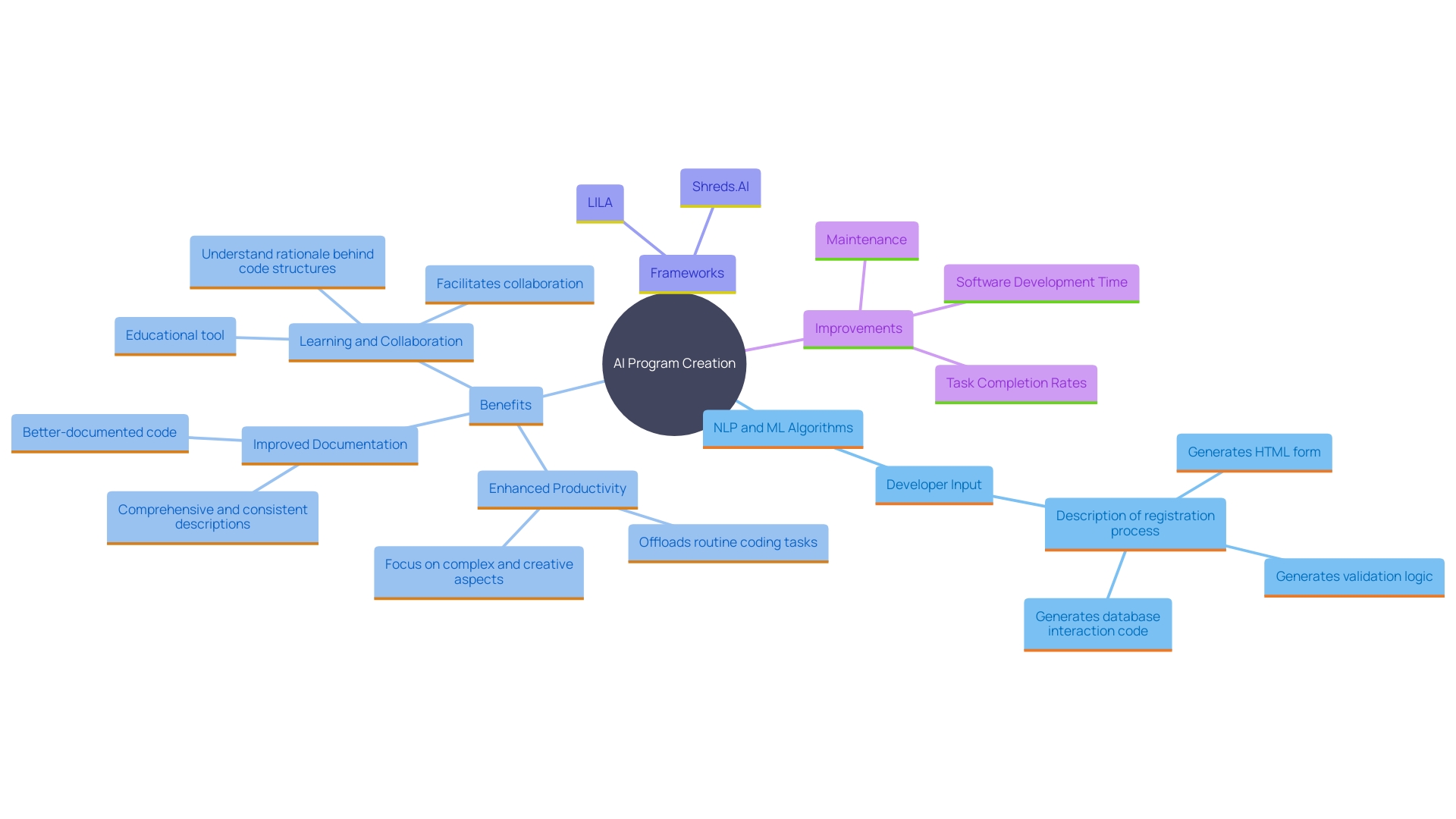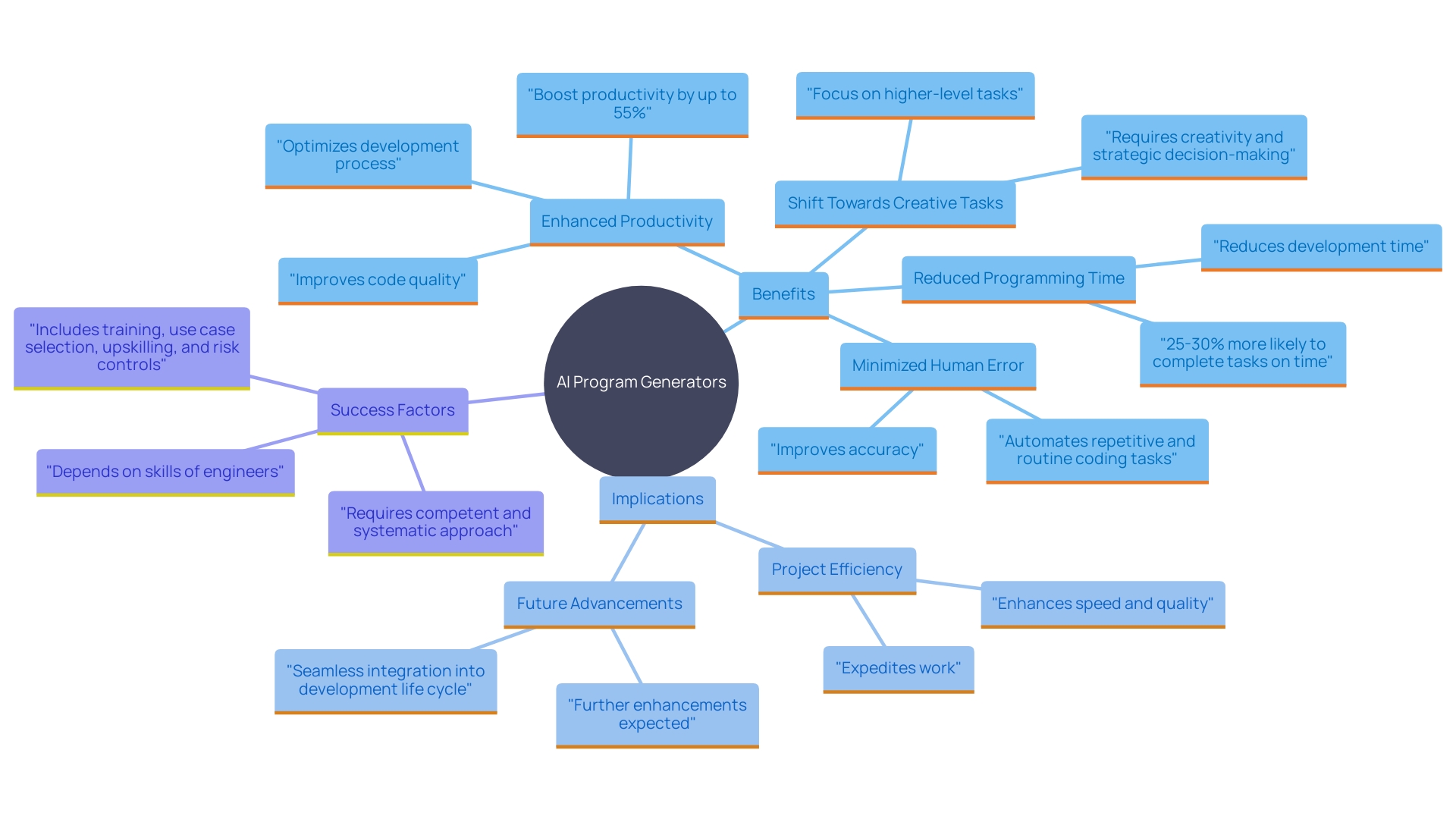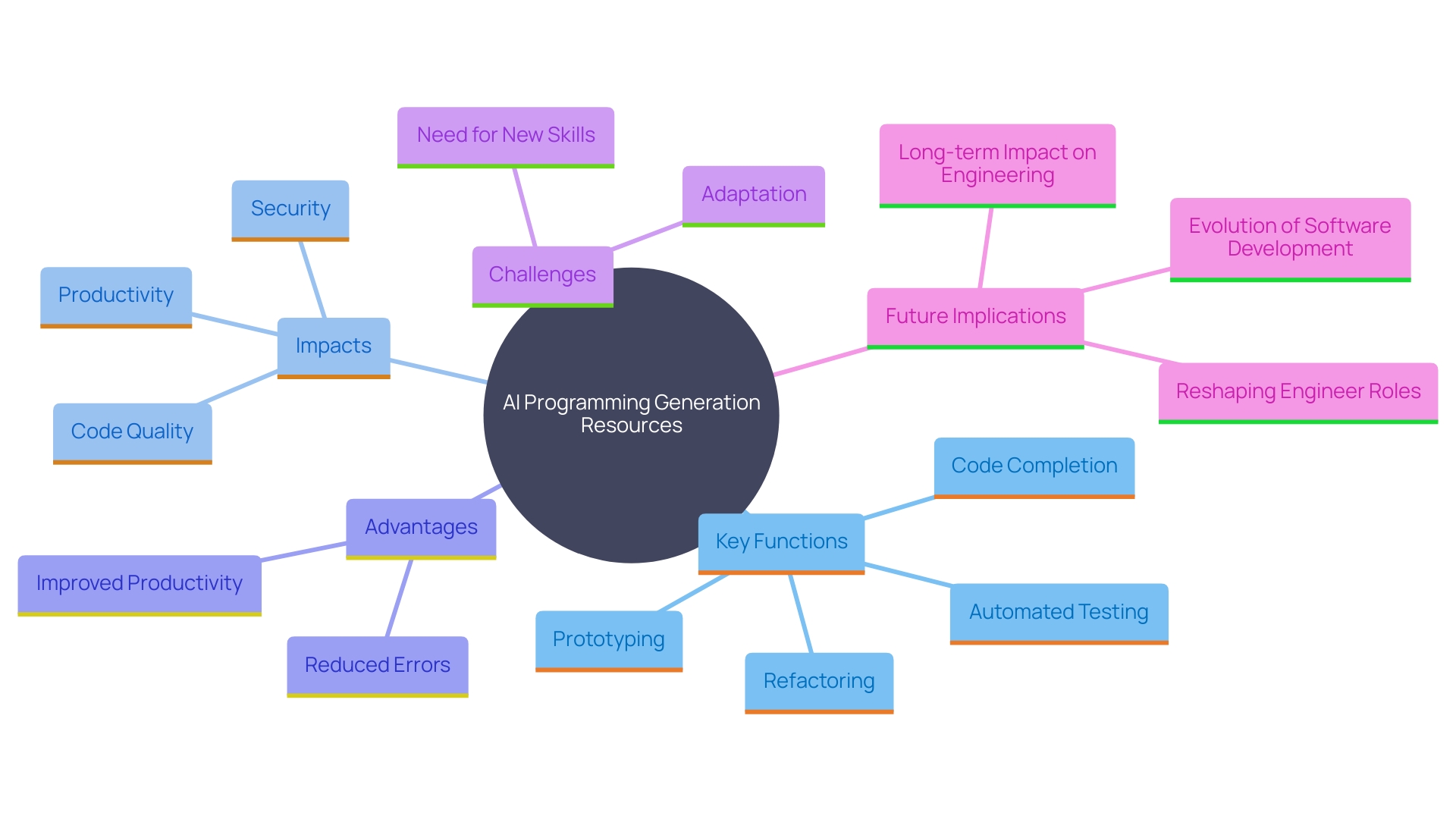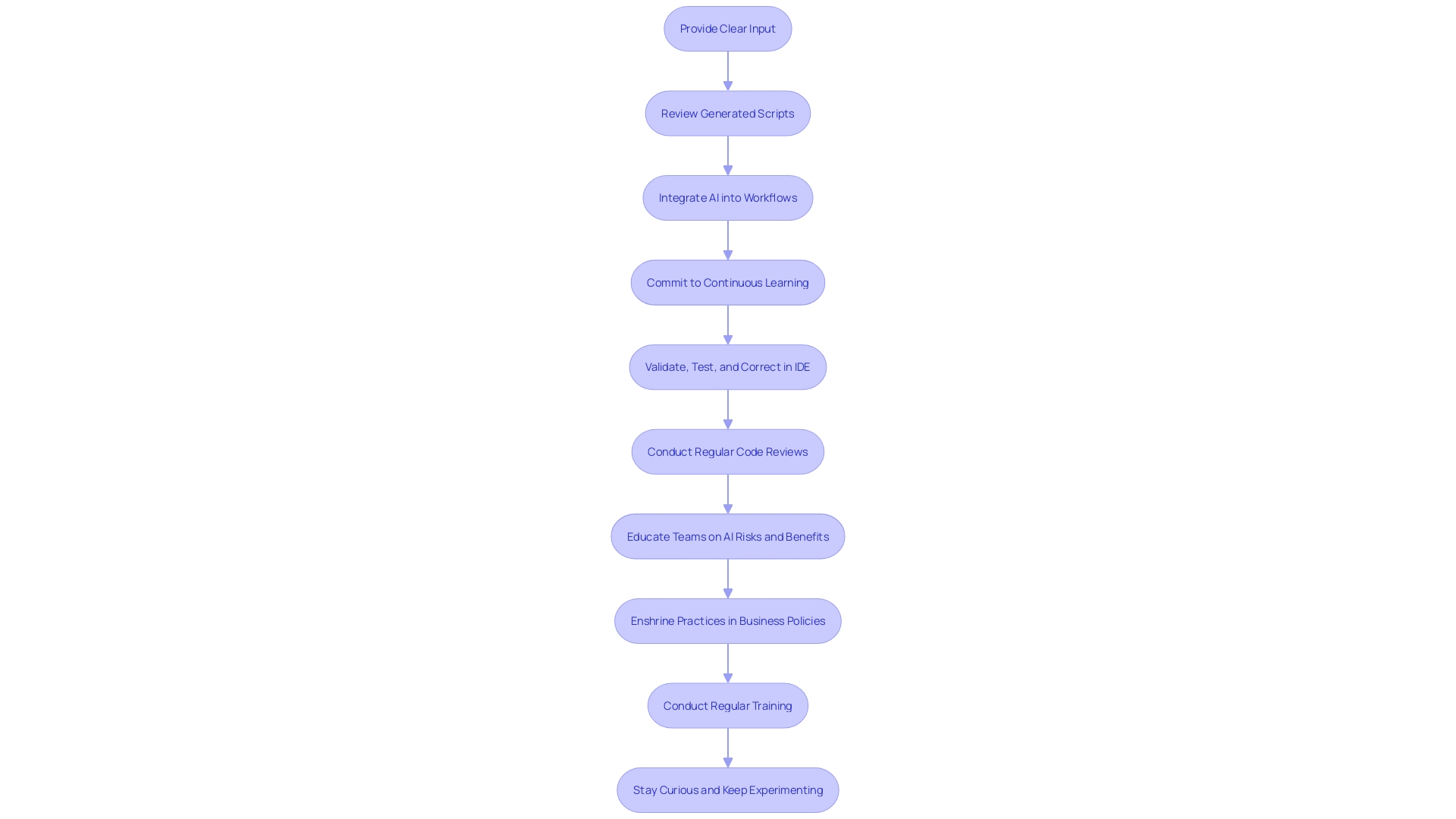Introduction
In today's fast-paced technological landscape, efficiency and productivity are paramount. As the demand for software development continues to soar, developers are constantly seeking innovative solutions to streamline their workflows and deliver high-quality code swiftly. Enter AI code generation—a revolutionary technology that leverages artificial intelligence to automate the creation of code snippets or entire programs based on specific inputs.
This advancement not only accelerates the coding process but also allows developers to focus on more complex problem-solving and creative tasks. By utilizing AI-powered tools, software development teams can achieve remarkable improvements in speed and productivity, ultimately driving significant cost savings and fostering innovation across industries. Dive into the world of AI code generation to discover how it works, the benefits it brings, popular tools available, and best practices for implementation to unlock the full potential of this game-changing technology.
What is AI Code Generation?
AI program creation utilizes advanced artificial intelligence technologies to automatically generate snippets or complete applications based on specific inputs and requirements. This groundbreaking method significantly enhances the coding process, enabling developers to concentrate on higher-level design and complex problem-solving tasks rather than mundane coding activities. In a study carried out with hundreds of programming groups from a large multinational corporation, those employing AI-driven resources finished their assignments approximately 30% quicker on average compared to groups using conventional resources. AI tools, like natural language programming generation, automated testing, and intelligent completion, have shown significant enhancements in speed and productivity, resulting in efficiency gains and cost reductions across various industries. Based on Turing's AI-boosted enhancement experiment, generative AI has resulted in a 25% rise in programmer efficiency, highlighting its capacity to revolutionize project delivery and innovation cycles. This swift production cycle is unmatched in the industry and guarantees the delivery of high-quality, clean, and maintainable software. By providing real-time suggestions and corrections, AI supports developers in producing top-notch software that meets business needs, ultimately redefining the nature of coding and opening new opportunities for development.
How AI Code Generation Works
AI program creation utilizes natural language processing (NLP) and machine learning algorithms to convert plain language input from developers into executable instructions. By inputting requirements or specifications, developers can harness the power of AI to generate anything from simple functions to complex algorithms. For example, the LILA framework, assessed on various programming generation tasks, demonstrated superior quality and task completion rates compared to standard models. This success is attributed to its integration of natural language planning to guide the Ai's search and generation process. Moreover, AI-driven solutions like Shreds.AI have slashed software development time and costs by over 80%, as well as extending software lifespan by more than 60% through automatic maintenance. These instruments not only improve developer efficiency but also guarantee the provision of high-quality, maintainable software.

Benefits of AI Code Generation
Utilizing AI program generators brings about substantial benefits, such as enhanced productivity, reduced programming time, and minimized human error. Studies have shown that AI-driven resources such as natural language code creation, automated testing, and smart code completion can greatly speed up the programming process. For instance, a randomized controlled trial involving hundreds of programming teams from a large multinational corporation found that those using AI tools completed tasks about 30% faster than those relying on conventional methods. This implies that AI-driven coding helpers can significantly enhance application creation pace and effectiveness.
Furthermore, AI's capability to automate routine coding activities enables developers to concentrate on more creative and intricate elements of application creation. This shift not only boosts overall project efficiency but also fosters a more engaging and intellectually stimulating work environment. As AI technologies continue to advance, they will likely provide even more sophisticated features, further changing the environment of software creation and resulting in substantial cost reductions across diverse sectors.

Popular AI Code Generation Tools
AI programming generation resources such as GitHub Copilot, OpenAI Codex, and Tabnine have transformed the manner in which developers create programs. These resources effortlessly combine with well-known programming settings, offering completions for scripts, producing templates, and even constructing complete functions based on the context of the script. GitHub Copilot, for example, utilizes AI to propose potential programming solutions as developers type, boosting productivity and enhancing the development experience.
Apart from developing programs, these AI tools broaden their functions to other essential elements of application development. Copilot, for instance, can aid in prototyping, automated testing, and refactoring by pinpointing areas for enhancement and proposing solutions. This multi-faceted approach not only streamlines the software delivery process but also allows developers to focus on more valuable tasks, ultimately delivering higher-quality software faster.
However, the integration of AI in programming has also led to notable changes in composition. Studies examining over 150 million lines of programming reveal a significant uptick in churn, with a decrease in reuse. This indicates that while AI resources enhance productivity, they may also introduce challenges related to code quality and maintenance.
In terms of security, AI-assisted tools continue to evolve, offering developers new ways to enhance the robustness of their applications. As the landscape of AI in software development grows, it's crucial for developers to stay informed and adapt to these advancements to maximize their benefits while mitigating potential downsides.

Best Practices for Implementing AI Code Generation
To harness the full potential of AI programming generators, developers must adhere to best practices. First, providing clear and concise input is crucial. Developers should explain how the program will be utilized, the target user group, interfaces, and interactions with other systems. This contextual information guarantees that AI resources produce programming that corresponds with project-specific needs and organizational requirements.
Second, it's essential to review generated scripts for accuracy and security rigorously. AI systems, while advanced, are not infallible. Think of them as inexperienced developers who can process vast amounts of information but still require human oversight. Frequent evaluations of programming should be a vital aspect of the creation process, guaranteeing that AI-generated scripts satisfy performance and security criteria.
Integrating AI resources smoothly into current workflows is another essential step. Automating testing in virtual environments before deployment can prevent potential issues in live products and enhance overall efficiency. Companies like Intuit have successfully used AI to standardize code and documentation, improving their end-to-end development processes.
Continuous learning and adaptation to the latest AI advancements are also key. Staying updated with new benchmarks and tools can lead to significant improvements in coding efficiency. For instance, Google's internal tooling advancements have shown how rapidly AI can transform engineering practices.
By following these practices, developers can leverage AI to speed up application creation, reduce time, and enhance code quality. As AI tools become more integral to software development, they will shape the future of programming, making it more efficient and innovative.

Conclusion
AI code generation represents a transformative leap in software development, empowering developers to produce high-quality code at unprecedented speeds. By automating routine coding tasks, this technology allows teams to focus on complex problem-solving and creative endeavors, resulting in enhanced productivity and efficiency. Studies indicate that teams utilizing AI tools can complete tasks approximately 30% faster, underscoring the considerable time and cost savings that can be achieved.
The integration of AI-driven tools, such as GitHub Copilot and OpenAI Codex, further streamlines the coding process. These tools not only assist in writing code but also enhance various aspects of development, including testing and refactoring. This multifaceted approach not only accelerates software delivery but also improves overall code quality, fostering a more engaging and innovative work environment.
To maximize the benefits of AI code generation, adherence to best practices is essential. Providing clear input, conducting thorough code reviews, and integrating AI tools into existing workflows ensure that the generated code meets project specifications and security standards. By embracing these practices, developers can navigate the evolving landscape of software development, leveraging AI to achieve remarkable improvements in efficiency and productivity.
The future of programming is bright, with AI at the forefront, paving the way for a more efficient and innovative development process.
Frequently Asked Questions
What is AI program creation?
AI program creation involves utilizing advanced artificial intelligence technologies to automatically generate code snippets or complete applications based on specific inputs and requirements. This method allows developers to focus on higher-level design and complex problem-solving.
How does AI program creation improve productivity?
AI-driven tools enhance productivity by enabling developers to complete tasks about 30% faster compared to traditional methods. These tools automate routine coding activities, allowing developers to concentrate on more creative and complex aspects of application development.
What technologies are used in AI program creation?
AI program creation employs natural language processing (NLP) and machine learning algorithms to convert plain language input into executable instructions. This allows developers to generate a wide range of programming outputs from simple functions to complex algorithms.
Can you provide an example of an AI tool used in program creation?
An example of an AI tool is the LILA framework, which has demonstrated superior quality and task completion rates in programming generation tasks. Another example is Shreds.AI, which has significantly reduced software development time and costs.
What are the benefits of using AI-driven programming tools?
The benefits of using AI-driven programming tools include enhanced productivity, reduced programming time, minimized human error, improved quality of software produced, and increased efficiency and cost reductions.
How do AI tools like GitHub Copilot work?
AI tools like GitHub Copilot integrate seamlessly with popular programming environments to provide code completions, generate templates, and construct complete functions based on the context of the script, thereby enhancing the development experience.
Are there any challenges associated with AI program creation?
Yes, while AI tools improve productivity, they may also lead to increased code churn and decreased code reuse. This can introduce challenges related to code quality and maintenance.
What best practices should developers follow when using AI programming generators?
Developers should provide clear and concise input detailing program usage and requirements, rigorously review generated code for accuracy and security, integrate AI tools into existing workflows seamlessly, and stay updated on the latest AI advancements and tools to enhance efficiency.
How does AI affect the security of software development?
AI-assisted tools are evolving to enhance the security of applications. However, developers must remain vigilant and adapt to the advancements in AI to mitigate potential security risks.
What is the future of AI in software development?
As AI tools become more integral to software development, they are expected to further revolutionize the coding process, making it more efficient and innovative, while also shaping the future landscape of programming.




